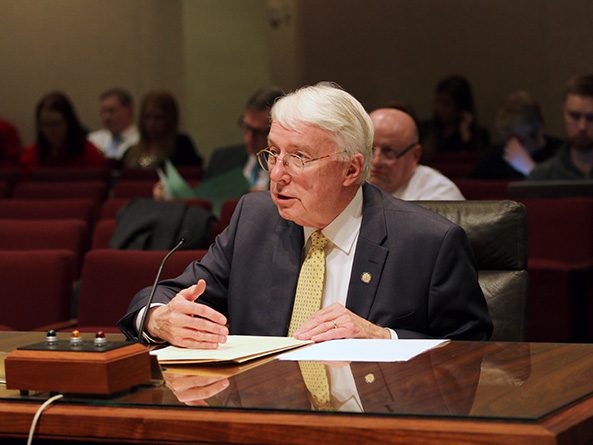Elimination of developmental disability entitlement proposed
An entitlement that prioritized services for high school graduates with developmental disabilities would be permanently eliminated by a bill heard Jan. 25 by the Health and Human Services Committee.

The entitlement was halted for fiscal year 2017-18 and FY2018-19 during the 2017 legislative session in order to bring Nebraska into compliance with federal law. The entitlement prioritized services for graduates or those reaching age 21, which violates a home and community-based services waiver federal requirement that the state first serve individuals with the highest priority status.
LB793, introduced by Ralston Sen. Merv Riepe, would permanently eliminate the entitlement, which otherwise would resume in FY2020. Services under the entitlement could not be paid with waiver funds, Riepe said, so the state would have to forego federal matching funds for those services if the entitlement were allowed to resume.
“As chairman of the Health and Human Services Committee, I want to see that the state is providing services to as many individuals as possible with the funding we have available,” Riepe said. “Is continuing to fund the high school entitlement with 100 percent general funds a fiscally responsible way to use taxpayers’ dollars when the state could maximize the dollars to support more individuals with developmental disabilities, through the waiver, with federal and state funds?”
In current law, without the entitlement, individuals transitioning from the state’s educational system upon reaching age 21—who require services to maintain skills and pursue economic self-sufficiency—are considered level-four priority under the waiver’s five levels of prioritization for services.
Courtney Miller, director of the state Division of Developmental Disabilities of the Health and Human Services Department, testified in support of the bill. She said that allowing the entitlement to resume would result in state law prioritizing the needs of graduates above individuals currently considered level-one priority—those who are in immediate crisis due to health and safety concerns.
“[This bill] will ensure that we align our funding priorities to meet the needs of individuals eligible for developmental disability services,” she said. “The department is committed to prioritization based upon the severity of the participants’ need and other qualifying circumstances.”
Phil Gray, a parent testifying on behalf of Persons for Appropriate Special Services, spoke in opposition to LB793. No one wants to interfere with services for young people in crisis, he said, but the transition from high school is a very difficult time for families of developmentally disabled individuals.
Suspension of the entitlement hasn’t been in place long enough to determine the impact, he said, and senators should study the results before permanently eliminating it.
“This bill eliminates the one shred of stability in the life of a family with a handicapped son or daughter—that when they come out of school, there are some services going to be available to them,” Gray said.
Alan Zavodny, chief executive officer of NorthStar Services, agreed. Also testifying in opposition to the bill, he said the entitlement was put in place in the mid-1990s because policymakers realized the cost of not supporting graduates.
“We know that these young people lose vital skills if there are disruptions in supports,” Zavodny said. “I can’t imagine that it won’t cost more [in the long-term] because people are going to need a higher level of supports if there is that disruption in services, because skills will be lost.”
The committee took no immediate action on LB793.


